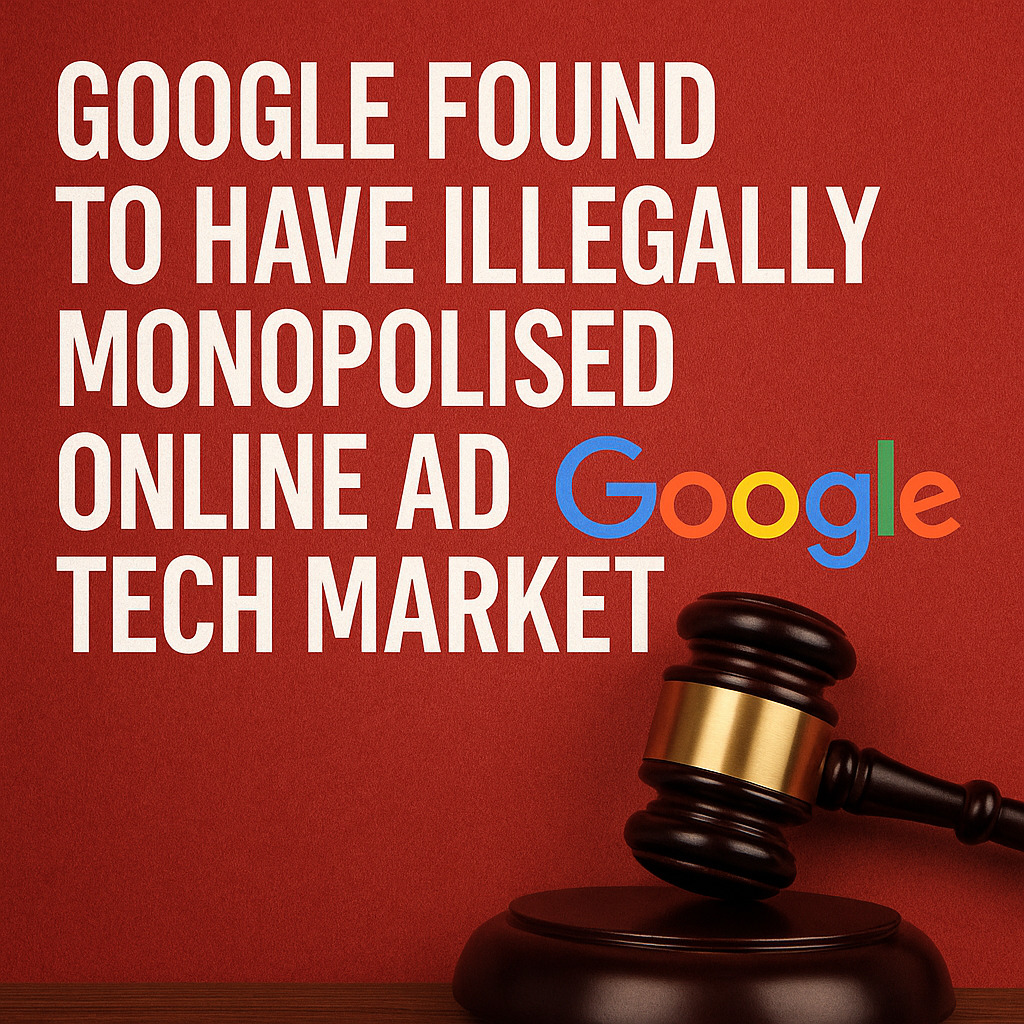View News
Google-Found-to-Have-Illegally-Monopolised-Online-Ad-Tech-Market-A-Landmark-Antitrust-Ruling

Google Found to Have Illegally Monopolised Online Ad Tech Market: A Landmark Antitrust Ruling
In a significant development in the tech world, Google has once again come under legal fire for monopolistic practices—this time concerning its dominance in online advertising technology. In a ruling delivered by U.S. District Judge Leonie Brinkema, the court found that Google had unlawfully maintained monopolies in key components of the digital advertising ecosystem. This judgment represents the second time in less than a year that the tech giant has been formally labelled an abusive monopolist by the U.S. judiciary.
Background of the Case
The case stems from a high-profile lawsuit filed by the U.S. Department of Justice (DOJ), joined by several states, aimed at dismantling Google’s stranglehold over digital advertising. The lawsuit alleged that Google had monopolised three critical areas of the online advertising market:
-
Publisher Ad Servers – Software that helps websites manage ad space.
-
Ad Exchanges – Digital marketplaces that facilitate the buying and selling of ads in real-time.
-
Advertiser Tools – Platforms that allow businesses to buy ads and manage their campaigns.
While the court agreed that Google held monopolistic control over the first two markets, it did not extend that finding to the third area—advertiser tools. Nevertheless, the ruling confirms the DOJ's claims that Google's anti-competitive conduct significantly hindered market competition and innovation in the digital ad space.
The Judge’s Findings
In her 115-page opinion, Judge Brinkema meticulously outlined how Google used its dominant position to fortify and expand its market power. The findings showed that Google had intentionally integrated its publisher ad server (DoubleClick for Publishers) with its ad exchange (AdX) through a series of restrictive contracts and policies. This integration allowed Google to:
-
Preferentially route ad traffic through its own systems,
-
Disadvantage rival ad exchanges and ad tech platforms, and
-
Limit options available to publishers and advertisers.
The judge underscored that such practices were not just aggressive competition but crossed the legal threshold into unlawful monopolisation. She wrote that these actions “distorted the market to Google’s benefit” and “systematically disadvantaged competitors.”
Impact on Google’s Business Model
The court’s decision could have far-reaching consequences for Google’s business model, especially its highly profitable ad technology segment, which is a significant source of revenue for its parent company, Alphabet Inc. The Justice Department has signaled its intention to seek strong remedies, which could include:
-
Structural separation or divestiture of certain parts of Google’s ad tech business,
-
Imposition of behavioral restrictions to prevent future anti-competitive practices,
-
Independent oversight of Google’s ad operations to ensure compliance.
These actions could disrupt the integrated framework that Google has relied on to dominate digital advertising, possibly opening the door to new competitors and increased transparency in the online ad market.
Broader Implications for the Tech Industry
This ruling is emblematic of a larger movement within global regulatory frameworks to rein in the outsized influence of Big Tech companies. The decision follows a wave of antitrust scrutiny directed at firms like Amazon, Apple, Meta (Facebook), and Microsoft, reflecting mounting concerns over the concentration of power in the hands of a few technology giants.
The Google case, in particular, is likely to set a precedent for future legal actions in the tech space, especially those involving the integration of products and services in a manner that forecloses competition. It also signals a more assertive stance by regulators and courts when dealing with complex digital markets.
What Lies Ahead: Future Legal Proceedings
While the ruling establishes liability, the question of remedies is still pending. Separate legal proceedings will now determine the extent and nature of corrective measures Google must take. These could be decided through negotiations, further litigation, or court-ordered mandates.
Moreover, the DOJ is actively pursuing a second major antitrust case against Google—this one targeting its dominance in the search engine market. That case is expected to go to trial later this year and could compound the regulatory pressure on the company.
Conclusion
Judge Brinkema’s ruling against Google represents a pivotal moment in the fight against monopolistic behavior in the tech industry. By confirming that Google leveraged its market position to suppress competition in digital advertising, the court has taken a decisive step toward rebalancing the digital economy. The repercussions for Google, and for the broader tech landscape, are likely to unfold in the months and years ahead—reshaping how advertising works online and possibly altering the future trajectory of Big Tech regulation.
"Unlock the Potential of Legal Expertise with LegalMantra.net - Your Trusted Legal Consultancy Partner”
Disclaimer: Every effort has been made to avoid errors or omissions in this material in spite of this, errors may creep in. Any mistake, error or discrepancy noted may be brought to our notice which shall be taken care of in the next edition In no event the author shall be liable for any direct indirect, special or incidental damage resulting from or arising out of or in connection with the use of this information Many sources have been considered including Newspapers, Journals, Bare Acts, Case Materials , Charted Secretary, Research Papers etc.

